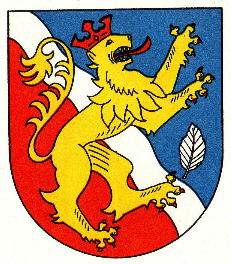Georgweierbach: Difference between revisions
Jump to navigation
Jump to search
Knorrepoes (talk | contribs) No edit summary |
Knorrepoes (talk | contribs) m (Text replace - "|width="15%"|50 px|right |}" to "|width="15%"|50 px|right |}<seo title="Wappen, Gemeindewappen" />") |
||
| Line 3: | Line 3: | ||
|width="70%" align="center" |'''Heraldry of the World<br/>Civic heraldry of [[Germany]] - [[Deutsche Wappen|Deutsche Wappen (Gemeindewappen/Kreiswappen)]]''' | |width="70%" align="center" |'''Heraldry of the World<br/>Civic heraldry of [[Germany]] - [[Deutsche Wappen|Deutsche Wappen (Gemeindewappen/Kreiswappen)]]''' | ||
|width="15%"|[[File:Germany.jpg|50 px|right]] | |width="15%"|[[File:Germany.jpg|50 px|right]] | ||
|} | |}<seo title="Wappen, Gemeindewappen" /> | ||
Revision as of 17:19, 5 November 2012
| Heraldry of the World Civic heraldry of Germany - Deutsche Wappen (Gemeindewappen/Kreiswappen) |
GEORGWEIERBACH
State : Rheinland-Pfalz
District (Kreis) : Birkenfeld
Incorporated into: 1970 Idar-Oberstein
Official blazon
Origin/meaning
The arms were officially granted on October 15, 1965.
The lion is taken from the arms of the medieval Lords of Wierbach, who had their castle in the village. The blue and red colours are derived from the arms of Oldenburg, as the area belonged to Oldenburg for a long period of time.
The wavy silver bend is a canting symbol for the -bach part of the name (Bach means river). The leaf is a leaf of he Common hornbeam (Carpinus betulus), Hainbuche in German, as the village is known in the area as Hambiiche.
Literature : Heyen und Zimmer, 1966

